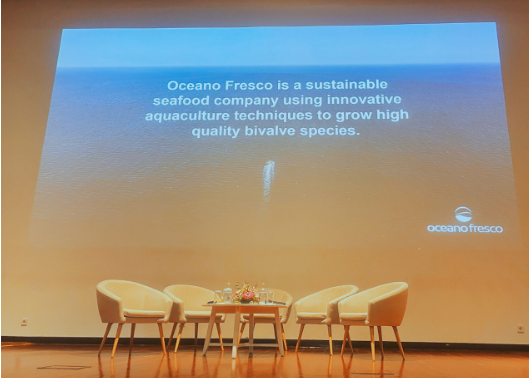Aquaculture
- Susanne Wedin-Schildt

- Apr 8, 2024
- 4 min read
Updated: Mar 26

What is it?
Aquaculture is the practice of cultivating aquatic organisms such as fish, shellfish, and aquatic plants in controlled environments. Unlike traditional fishing, and fisheries, which involves capturing wild fish, aquaculture entails rearing these organisms in tanks, enclosures, or controlled marine areas. It includes various practices like mariculture (in marine environments), freshwater farming, algaculture (growing algae), and the production of ornamental fish for aquariums.
Why Care?
Food Security: Aquaculture provides a significant portion of the world's seafood, offering a sustainable alternative to overfishing, which is depleting wild fish stocks.
Economic Benefits: It creates employment opportunities, particularly in coastal and rural areas, and contributes to the economy through the supply chain associated with fish farming.
Nutritional Value: Seafood from aquaculture is a key source of protein, omega-3 fatty acids, vitamins, and minerals for millions worldwide.
Sustainability: When practised responsibly, aquaculture can be more sustainable than other forms of animal protein production, with lower greenhouse gas emissions and resource usage.
What are the main Challenges?
Environmental Impact: Issues such as waste management, the spread of diseases to wild fish populations, and the use of antibiotics and chemicals are major concerns.
Resource Use: Sustainable sourcing of feed, particularly fishmeal and fish oil, remains a challenge, as does the efficient use of water and land resources.
Social and Economic Issues: Ensuring fair labour practices, equitable distribution of benefits, and addressing the socio-economic impact on traditional fishing communities are ongoing challenges.
Regulation and Management: Developing and enforcing effective regulations to ensure sustainable practices, animal welfare, and environmental protection is crucial.
What are the Good Practices?
Technological Innovations: The use of advanced technologies for monitoring water quality, fish health, and optimizing feeding regimes is transforming the industry.
Integrated Multi-Trophic Aquaculture (IMTA): This innovative approach involves cultivating different species together, where the by-products of one species are used as inputs for another, creating a sustainable ecosystem.
Genetic Research: Advances in genetics are improving fish breeds, making them more disease-resistant and faster-growing, which enhances productivity and sustainability.
What are Innovation trends - are there any exciting Start-Ups?
Aquaculture is poised for significant growth due to rising global seafood demand and advancements in sustainable farming practices. The future of aquaculture lies in developing environmentally friendly and socially responsible methods, ensuring that it contributes to food security without compromising the health of our oceans and the well-being of local communities.
Recirculating Aquaculture Systems (RAS) have gained popularity in aquaculture for their ability to efficiently manage water use and waste, as well as for their potential to produce fish in a controlled environment. Here are some leading startups that apply RAS in their aquaculture production:
Atlantic Sapphire: While not strictly a startup anymore, Atlantic Sapphire is pioneering land-based salmon farming using RAS. Headquartered in Norway with operations also in the United States, they utilize RAS technology to produce salmon sustainably, with a focus on minimizing environmental impact.
Nordic Aquafarms: Another company focusing on land-based aquaculture, Nordic Aquafarms, is based in Norway and the United States. They are developing large-scale RAS facilities for salmon and other species, aiming to provide sustainable seafood while reducing the industry's reliance on ocean-based farming.
AquaMaof: Headquartered in Israel and a global leader in RAS technology for various fish species including salmon, trout, and tilapia. They design and build RAS facilities and offer expertise in aquaculture production systems.
The Kingfish Company: Originally known as Kingfish Zeeland, The Kingfish Company, based in the Netherlands, operates RAS facilities for the production of Dutch Yellowtail, a sustainable alternative to wild-caught yellowtail. They focus on producing high-quality fish while minimizing environmental impact.
Pure Salmon: A global salmon farming company with a focus on land-based RAS facilities. They aim to produce salmon sustainably and locally, reducing the carbon footprint associated with traditional salmon farming methods.
Beyond RAS, there are other sustainable aquaculture start-ups bringing solutions to the market. Here are a few examples
Veruna (United States)
Innovative aquaponic systems integrating fish farming and hydroponic plant cultivation.
BioFishency (Israel)
Compact and efficient water treatment solutions for aquaculture systems.
VAKI (Iceland)
Fish counting and grading systems for improved management and productivity in aquaculture.
XpertSea (Canada)
AI-powered technology for aquaculture data management and optimization of production.
Blue Aqua (Singapore)
Aquafeed and health products for sustainable shrimp and fish farming.
AKVA group (Norway)
Technology and equipment provider for sustainable aquaculture operations, including fish farming cages and feeding systems.
Oceano Fresco (Portugal)
Oceano Fresco utilizes innovative aquaculture techniques focusing on hatchery production, nursery rearing, and grow-out farming of flat oysters, with the goal of restoring oyster populations in European waters while also providing a sustainable source of premium seafood.. This industry has been in decline due to factors such as disease and overfishing.

While in comparison the investments in this category are minor, the expectation is for this to change drastically in the near future, considering an increasing demand for protein to feed a growing world population.
.png)



Comments